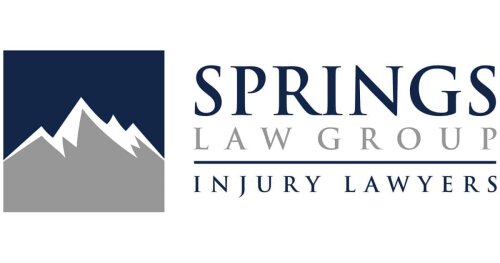Best Antitrust Litigation Lawyers in Colorado Springs
Share your needs with us, get contacted by law firms.
Free. Takes 2 min.
List of the best lawyers in Colorado Springs, United States

About Antitrust Litigation Law in Colorado Springs, United States
Antitrust litigation refers to legal actions involving disputes over unfair business practices that restrict competition, such as price fixing, monopolization, bid rigging, or other forms of anti-competitive behavior. In Colorado Springs, as in the rest of the United States, antitrust laws are designed to promote fair competition and protect consumers and businesses from unfair practices. The primary laws governing antitrust litigation are federal statutes, but Colorado state law also offers protections and remedies for those harmed by anti-competitive conduct.
Why You May Need a Lawyer
Situations that commonly require legal help in antitrust matters include allegations of price collusion between competitors, attempts by one business to monopolize a market, unfair contract terms that restrict competition, or mergers and acquisitions that may harm consumer choice. Both businesses and individuals can be affected by antitrust violations. A lawyer can help if you believe your business is being hurt by anti-competitive conduct, have been accused of violating antitrust law, or if you are facing investigation by federal or state authorities. Navigating the complexities of antitrust litigation requires knowledge of both state and federal law, and having a qualified attorney on your side is essential for protecting your interests.
Local Laws Overview
Colorado follows both federal and state antitrust laws. The key federal laws are the Sherman Act, Clayton Act, and the Federal Trade Commission Act. At the state level, Colorado’s Antitrust Act of 1992 mirrors many federal protections and grants authority to the Colorado Attorney General to enforce these laws. Local businesses must be aware that practices such as price fixing, bid rigging, or exclusionary agreements may be illegal and can lead to severe civil and criminal penalties. Private parties in Colorado Springs who have suffered harm due to anti-competitive business conduct may also bring a lawsuit to recover damages. Courts in Colorado may apply both state and federal law, depending on the specifics of the case.
Frequently Asked Questions
What is antitrust litigation?
Antitrust litigation involves legal disputes concerning actions that allegedly harm free competition in the marketplace, such as illegal monopolies, price fixing, or unfair trade practices.
Who enforces antitrust laws in Colorado Springs?
Antitrust laws are enforced both at the federal level by the Department of Justice and the Federal Trade Commission, and at the state level by the Colorado Attorney General’s Office.
What types of conduct are prohibited by antitrust laws?
Prohibited conduct includes price fixing, bid rigging, market allocation, abuse of dominant market position, predatory pricing, and certain types of exclusive dealing arrangements.
Can individuals file antitrust lawsuits, or are these only for businesses?
Both individuals and businesses can file antitrust lawsuits if they have suffered direct harm as a result of anti-competitive practices.
What are the possible outcomes of an antitrust lawsuit?
Possible outcomes include monetary damages for injured parties, injunctive relief to stop unlawful conduct, or penalties for offending companies or individuals.
What is the statute of limitations for antitrust claims in Colorado?
Generally, the statute of limitations is four years from the date of the alleged violation, but specific facts or claims may affect the time limits.
Are all large mergers subject to antitrust review?
Many large mergers must be reported to federal agencies for antitrust review, especially if they meet certain size thresholds, to ensure they do not harm competition.
What is a class action in antitrust litigation?
A class action allows a group of people or businesses harmed by the same anti-competitive practice to file a single lawsuit together against the violator.
How can a lawyer help with my antitrust case?
A lawyer can help you assess whether you have a viable claim, gather necessary evidence, represent you in negotiations or court, and navigate the complexities of antitrust law.
What penalties can companies face if found guilty of violating antitrust laws?
Penalties can include substantial fines, restitution to injured parties, court orders to change business practices, and, in some cases, criminal charges against individuals.
Additional Resources
Those seeking more information or assistance can contact the following organizations:
- Colorado Attorney General - Antitrust Unit - US Department of Justice - Antitrust Division - Federal Trade Commission - Local Chamber of Commerce (for business resources) - Colorado Bar Association - Lawyer referral services
Next Steps
If you believe you are involved in or affected by an antitrust issue in Colorado Springs, consider the following steps:
1. Document all relevant facts, conduct, and correspondence. 2. Consult with an attorney specializing in antitrust law to evaluate your case. 3. Contact local or state authorities if you suspect ongoing or widespread anti-competitive conduct. 4. Stay informed about your rights and potential remedies under state and federal law. 5. If appropriate, file a formal complaint or lawsuit with the help of a qualified legal professional.
Taking prompt action is crucial, as time limits may restrict your ability to seek legal remedies. An experienced antitrust lawyer can guide you through the process and help protect your rights.
Lawzana helps you find the best lawyers and law firms in Colorado Springs through a curated and pre-screened list of qualified legal professionals. Our platform offers rankings and detailed profiles of attorneys and law firms, allowing you to compare based on practice areas, including Antitrust Litigation, experience, and client feedback.
Each profile includes a description of the firm's areas of practice, client reviews, team members and partners, year of establishment, spoken languages, office locations, contact information, social media presence, and any published articles or resources. Most firms on our platform speak English and are experienced in both local and international legal matters.
Get a quote from top-rated law firms in Colorado Springs, United States — quickly, securely, and without unnecessary hassle.
Disclaimer:
The information provided on this page is for general informational purposes only and does not constitute legal advice. While we strive to ensure the accuracy and relevance of the content, legal information may change over time, and interpretations of the law can vary. You should always consult with a qualified legal professional for advice specific to your situation.
We disclaim all liability for actions taken or not taken based on the content of this page. If you believe any information is incorrect or outdated, please contact us, and we will review and update it where appropriate.









